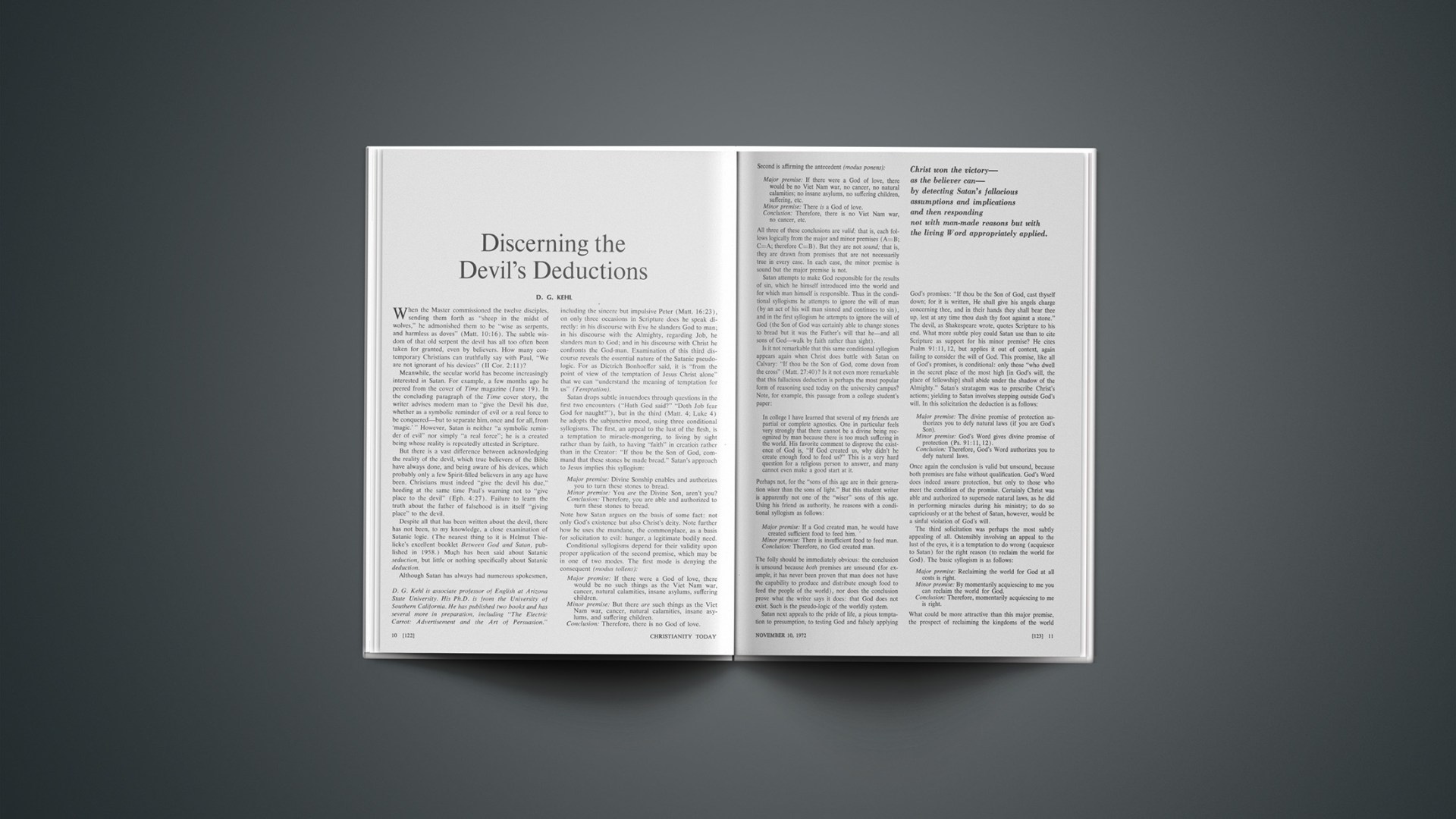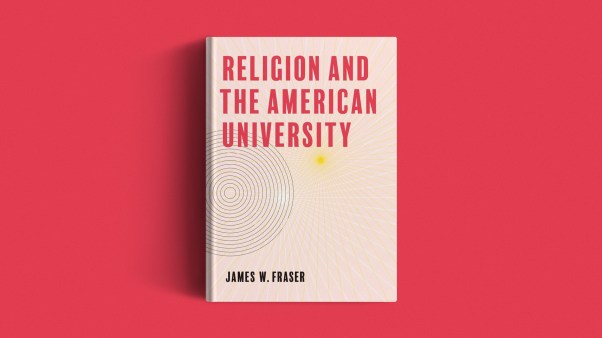When the Master commissioned the twelve disciples, sending them forth as “sheep in the midst of wolves,” he admonished them to be “wise as serpents, and harmless as doves” (Matt. 10:16). The subtle wisdom of that old serpent the devil has all too often been taken for granted, even by believers. How many contemporary Christians can truthfully say with Paul, “We are not ignorant of his devices” (2 Cor. 2:11)?
Meanwhile, the secular world has become increasingly interested in Satan. For example, a few months ago he peered from the cover of Time magazine (June 19). In the concluding paragraph of the Time cover story, the writer advises modern man to “give the Devil his due, whether as a symbolic reminder of evil or a real force to be conquered—but to separate him, once and for all, from ‘magic.’ ” However, Satan is neither “a symbolic reminder of evil” nor simply “a real force”; he is a created being whose reality is repeatedly attested in Scripture.
But there is a vast difference between acknowledging the reality of the devil, which true believers of the Bible have always done, and being aware of his devices, which probably only a few Spirit-filled believers in any age have been. Christians must indeed “give the devil his due,” heeding at the same time Paul’s warning not to “give place to the devil” (Eph. 4:27). Failure to learn the truth about the father of falsehood is in itself “giving place” to the devil.
Despite all that has been written about the devil, there has not been, to my knowledge, a close examination of Satanic logic. (The nearest thing to it is Helmut Thielicke’s excellent booklet Between God and Satan, published in 1958.) Much has been said about Satanic seduction, but little or nothing specifically about Satanic deduction.
Although Satan has always had numerous spokesmen, including the sincere but impulsive Peter (Matt. 16:23), on only three occasions in Scripture does he speak directly: in his discourse with Eve he slanders God to man; in his discourse with the Almighty, regarding Job, he slanders man to God; and in his discourse with Christ he confronts the God-man. Examination of this third discourse reveals the essential nature of the Satanic pseudo-logic. For as Dietrich Bonhoeffer said, it is “from the point of view of the temptation of Jesus Christ alone” that we can “understand the meaning of temptation for us” (Temptation).
Satan drops subtle innuendoes through questions in the first two encounters (“Hath God said?” “Doth Job fear God for naught?”), but in the third (Matt. 4; Luke 4) he adopts the subjunctive mood, using three conditional syllogisms. The first, an appeal to the lust of the flesh, is a temptation to miracle-mongering, to living by sight rather than by faith, to having “faith” in creation rather than in the Creator: “If thou be the Son of God, command that these stones be made bread.” Satan’s approach to Jesus implies this syllogism:
Major premise: Divine Sonship enables and authorizes you to turn these stones to bread.
Minor premise: You are the Divine Son, aren’t you?
Conclusion: Therefore, you are able and authorized to turn these stones to bread.
Note how Satan argues on the basis of some fact: not only God’s existence but also Christ’s deity. Note further how he uses the mundane, the commonplace, as a basis for solicitation to evil: hunger, a legitimate bodily need.
Conditional syllogisms depend for their validity upon proper application of the second premise, which may be in one of two modes. The first mode is denying the consequent (modus tollens):
Major premise: If there were a God of love, there would be no such things as the Viet Nam war, cancer, natural calamities, insane asylums, suffering children.
Minor premise: But there are such things as the Viet Nam war, cancer, natural calamities, insane asylums, and suffering children.
Conclusion: Therefore, there is no God of love.
Second is affirming the antecedent (modus ponens):
Major premise: If there were a God of love, there would be no Viet Nam war, no cancer, no natural calamities; no insane asylums, no suffering children, suffering, etc.
Minor premise: There is a God of love.
Conclusion: Therefore, there is no Viet Nam war, no cancer, etc.
All three of these conclusions are valid; that is, each follows logically from the major and minor premises (A=B; C=A; therefore C=B). But they are not sound; that is, they are drawn from premises that are not necessarily true in every case. In each case, the minor premise is sound but the major premise is not.
Satan attempts to make God responsible for the results of sin, which he himself introduced into the world and for which man himself is responsible. Thus in the conditional syllogisms he attempts to ignore the will of man (by an act of his will man sinned and continues to sin), and in the first syllogism he attempts to ignore the will of God (the Son of God was certainly able to change stones to bread but it was the Father’s will that he—and all sons of God—walk by faith rather than sight).
Is it not remarkable that this same conditional syllogism appears again when Christ does battle with Satan on Calvary: “If thou be the Son of God, come down from the cross” (Matt. 27:40)? Is it not even more remarkable that this fallacious deduction is perhaps the most popular form of reasoning used today on the university campus? Note, for example, this passage from a college student’s paper:
In college I have learned that several of my friends are partial or complete agnostics. One in particular feels very strongly that there cannot be a divine being recognized by man because there is too much suffering in the world. His favorite comment to disprove the existence of God is, “If God created us, why didn’t he create enough food to feed us?” This is a very hard question for a religious person to answer, and many cannot even make a good start at it.
Perhaps not, for the “sons of this age are in their generation wiser than the sons of light.” But this student writer is apparently not one of the “wiser” sons of this age. Using his friend as authority, he reasons with a conditional syllogism as follows:
Major premise: If a God created man, he would have created sufficient food to feed him.
Minor premise: There is insufficient food to feed man.
Conclusion: Therefore, no God created man.
The folly should be immediately obvious: the conclusion is unsound because both premises are unsound (for example, it has never been proven that man does not have the capability to produce and distribute enough food to feed the people of the world), nor does the conclusion prove what the writer says it does: that God does not exist. Such is the pseudo-logic of the worldly system.
Satan next appeals to the pride of life, a pious temptation to presumption, to testing God and falsely applying God’s promises: “If thou be the Son of God, cast thyself down; for it is written, He shall give his angels charge concerning thee, and in their hands they shall bear thee up, lest at any time thou dash thy foot against a stone.” The devil, as Shakespeare wrote, quotes Scripture to his end. What more subtle ploy could Satan use than to cite Scripture as support for his minor premise? He cites Psalm 91:11, 12, but applies it out of context, again failing to consider the will of God. This promise, like all of God’s promises, is conditional: only those “who dwell in the secret place of the most high [in God’s will, the place of fellowship] shall abide under the shadow of the Almighty.” Satan’s stratagem was to prescribe Christ’s actions; yielding to Satan involves stepping outside God’s will. In this solicitation the deduction is as follows:
Major premise: The divine promise of protection authorizes you to defy natural laws (if you are God’s Son).
Minor premise: God’s Word gives divine promise of protection (Ps. 91:11, 12).
Conclusion: Therefore, God’s Word authorizes you to defy natural laws.
Once again the conclusion is valid but unsound, because both premises are false without qualification. God’s Word does indeed assure protection, but only to those who meet the condition of the promise. Certainly Christ was able and authorized to supersede natural laws, as he did in performing miracles during his ministry; to do so capriciously or at the behest of Satan, however, would be a sinful violation of God’s will.
The third solicitation was perhaps the most subtly appealing of all. Ostensibly involving an appeal to the lust of the eyes, it is a temptation to do wrong (acquiesce to Satan) for the right reason (to reclaim the world for God). The basic syllogism is as follows:
Major premise: Reclaiming the world for God at all costs is right.
Minor premise: By momentarily acquiescing to me you can reclaim the world for God.
Conclusion: Therefore, momentarily acquiescing to me is right.
What could be more attractive than this major premise, the prospect of reclaiming the kingdoms of the world from the Evil One? Was this not the express purpose of Christ’s coming into the world? But the minor premise is as false now as it was then; to do wrong in order to do right is wrong. Christ could reclaim fallen mankind only through death on the cross, not by a short-cut.
“The devil keeps advertising,” says a character in William Blatty’s best-selling novel The Exorcist; “the devil does lots of commercials.” He does indeed, and he uses commercial logic, reducing God to a mere premise in a Satanic syllogism. Christ won the victory—as the believer can—by detecting Satan’s fallacious assumptions and implications and then responding not with man-made reasons but with the living Word appropriately applied. To each of Satan’s subjunctives Christ responded with forceful indicatives: “It is written,” each time showing that he recognized Satan’s deductions for what they were. While he does not stoop to the logic-chopping of Satan, he does soundly refute the fallacious assumptions in each temptation. For example:
Major premise: One who lives by faith does not trust in the merely physical.
Minor premise: The Son of God lives by faith.
Conclusion: Therefore, the Son of God does not trust in the merely physical.
Herein lies an instructive truth, perhaps the resolution to the apparent contradiction of Proverbs 26:4, 5:
Answer not a fool according to his folly [Don’t use foolish arguments as he does, The Living Bible], lest thou also be like unto him.
Answer a fool according to his folly [or, as his folly deserves, New American Standard Bible], lest he be wise in his own conceit.
While Christ did not stoop to the pseudo-logic of Satan, he did logically refute the Satanic assumptions. The believer, like Christ, must “size up him and the occasion and respond accordingly” (Prov. 26:5, Berkeley).
Just as there exist two kinds of wisdom, so there exist two kinds of logic, one a pseudo-logic of enticement, the other the authentic logic of divine pre-eminence. The former is part of the wisdom that is “earthly, sensual, demoniacal,” producing “confusion and every evil work” (Jas. 3:15, 16). The latter is part of the wisdom that is from above: “first pure, then peaceable, gentle, and easy to be entreated, full of mercy and good fruits, without partiality, and without hypocrisy” (Jas. 3:17). Such wisdom, and the logic it includes, is the work of the Holy Spirit; earthly wisdom, and the pseudo-logic it includes, is the work of the unholy spirit of this age.
Is it any wonder that Christ admonishes all believers, as he did the twelve, to be “subtle” (Berkeley), “shrewd” (NAS), “wary” (Wycliffe) as “serpents” (the ancient prototype of Satan), yet “innocent” (NAS), “without falsity” (Luther) “as doves” (the prototype of the divine Paraclete)? Being guileless as doves, we do not answer Satan according to his folly; we do not stoop to his earthly pseudo-logic. Instead, being wary as serpents in sizing up the argument and its assumptions, we answer Satan with divine logic as his folly deserves, lest he gain an advantage over us.
George M. Marsden is associate professor of history at Calvin College, Grand Rapids, Michigan. He has the Ph.D. (Yale University) and has written “The Evangelical Mind and the New School Presbyterian Experience.”










